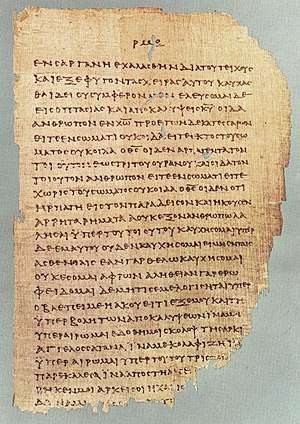2 Corinthians 5
2 Corinthians 5 is the fifth chapter of the Second Epistle to the Corinthians in the New Testament of the Christian Bible. It is authored by Paul the Apostle and Timothy (2 Corinthians 1:1) in Macedonia in 55–56 CE.[1]
| 2 Corinthians 5 | |
|---|---|
 A folio of Papyrus 46 (written ca. AD 200), containing 2 Corinthians 11:33–12:9. This manuscript contains almost complete parts of the whole Pauline epistles. | |
| Book | Second Epistle to the Corinthians |
| Category | Pauline epistles |
| Christian Bible part | New Testament |
| Order in the Christian part | 8 |
The 17th-century theologian John Gill summarises the contents of this chapter:
The apostle, in this chapter, enlarges upon the saints' comfortable assurance, expectation, and desire of the heavenly glory; discourses of the diligence and industry of himself and other Gospel ministers in preaching the word, with the reasons that induced them to it; and closes it with a commendation of the Gospel ministry from the important subject, sum, and substance of it.[2]
Text
The original text was written in Koine Greek. This chapter is divided into 21 verses.
Textual witnesses
Some early manuscripts containing the text of this chapter are:[lower-alpha 1]
- Papyrus 46 (c. AD 200)
- Codex Vaticanus (325–350)
- Codex Sinaiticus (330–360)
- Codex Ephraemi Rescriptus (c. 450)
- Codex Freerianus (c. 450; extant verses 8–10,17–18)
- Codex Claromontanus (c. 550)
Verse 1
- For we know that if our earthly house, this tent, is destroyed, we have a building from God, a house not made with hands, eternal in the heavens.[4]
- "Our earthly house": refers to the body; similarly, Plato also calls the body Greek: γὴινον σκήνον, gēinon skēnov, "an earthly tabernacle", just as the Jews call the body a house or a "tabernacle."[5] Abarbinel paraphrases Isaiah 18:4 "my dwelling place, which is the body, for that is "the tabernacle of the soul"."[6]
- "House not made with hands, eternal in the heavens": can be interpreted as "glorified body" after resurrection, or "the holy house" in the world to come,[7] which might be intended in Isaiah 56:5 or Proverbs 24:3.[2]
See also
- Transfiguration of Jesus
- Other related Bible parts: Isaiah 53, Romans 3, Romans 4, 2 Corinthians 4, Revelation 6
Notes
- The page(s) containing this chapter is currently missing from Codex Alexandrinus.[3]
References
- MacDonald 2007, p. 1134.
- John Gill's Exposition of the Entire Bible, 2 Corinthians 5:1
- Aland, Kurt; Aland, Barbara (1995). The Text of the New Testament: An Introduction to the Critical Editions and to the Theory and Practice of Modern Textual Criticism. Erroll F. Rhodes (trans.). Grand Rapids: William B. Eerdmans Publishing Company. pp. 107, 109. ISBN 978-0-8028-4098-1.
- 2 Corinthians 5:1 NKJV
- In Clement. Alexandr. Stromat. l. 5. p. 593. Quote: "every man (Sepher Caphtor, fol. 38. 2.) has two houses, "the house of the body" and the house of the soul"; one is the outward, the other the inward house." apud Gill, John. On 2 Corinthians 5:1.
- Mashmia Jeshua, fol. 11. 4
- Zohar in Exod. fol. 34. 3. & 35. 3.
Sources
- MacDonald, Margaret (2007). "66. 2 Corinthians". In Barton, John; Muddiman, John (eds.). The Oxford Bible Commentary (first (paperback) ed.). Oxford University Press. pp. 1134–1151. ISBN 978-0199277186. Retrieved February 6, 2019.
External links
- 2 Corinthians 5 King James Bible - Wikisource
- English Translation with Parallel Latin Vulgate
- Online Bible at GospelHall.org (ESV, KJV, Darby, American Standard Version, Bible in Basic English)
- Multiple bible versions at Bible Gateway (NKJV, NIV, NRSV etc.)